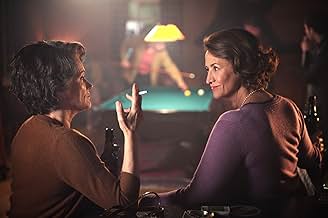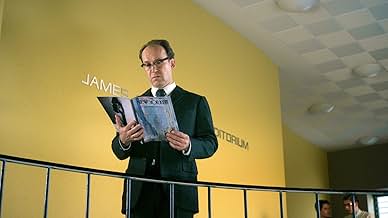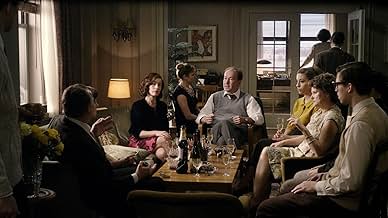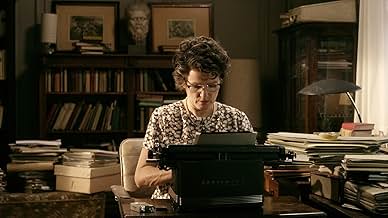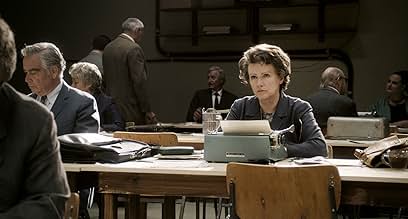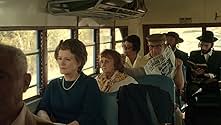Hannah Arendt
- 2012
- Tous publics
- 1h 53m
IMDb RATING
7.1/10
12K
YOUR RATING
A look at the life of philosopher and political theorist Hannah Arendt, who reported for 'The New Yorker' on the trial of the Nazi leader Adolf Eichmann in Jerusalem.A look at the life of philosopher and political theorist Hannah Arendt, who reported for 'The New Yorker' on the trial of the Nazi leader Adolf Eichmann in Jerusalem.A look at the life of philosopher and political theorist Hannah Arendt, who reported for 'The New Yorker' on the trial of the Nazi leader Adolf Eichmann in Jerusalem.
- Director
- Writers
- Stars
- Awards
- 8 wins & 18 nominations total
Leila Lallali
- Student Laureen
- (as Leila Schaus)
- Director
- Writers
- All cast & crew
- Production, box office & more at IMDbPro
Featured reviews
Margarethe von Trotta's Hannah Arendt is a film about thinking. Moreover, it's in favour of it. It so values thinking that it offers some elegant speeches and debate, sans computer generated spectaculars.
Barbara Sukowa portrays the German Jewish philosopher during the period she covered the Adolf Eichmann trial in Israel for The New Yorker. The film confronts the controversy Arendt raised when (i) she redefined Eichmann not as a monster but as an ordinary nobody, exemplifying "the banality of evil," (ii) she reported that some Jews collaborated with the Nazis, resulting in more deaths than chaos would have caused, and (iii) she said she loves her friends but not any "people," in this case, the Jews. On all three counts she was condemned for abandoning her people. Today, at a remove from the heat of that moment, she was clearly correct on all counts. For more see www.yacowar.blogspot.com.
Not loving the Jews was not being anti-Semitic but refusing to emotionalize her consideration of the issues. Arendt was opposed to the blanket love of any group of people, not based on personal engagement, because such nationalist or other group identification precluded the thoughtful consideration of any issues around them. She most valued a rational, thoughtful approach that was not prejudged or proscribed by any -ism or convention. As for some Jews' collaboration, she simply reported facts that arose at the trial. (Indeed, Rudolf van den Berg's new film Suskind details precisely that collaboration.) Nor was that observation anti-Semitic, for the possibly well-intentioned collaboration in the face of horrid danger is a plausible response among any people. Arendt was pilloried for facing the facts and for rejecting myths. That's what historians are required to do and apparently what philosophers periodically have to remind them to do.
Barbara Sukowa portrays the German Jewish philosopher during the period she covered the Adolf Eichmann trial in Israel for The New Yorker. The film confronts the controversy Arendt raised when (i) she redefined Eichmann not as a monster but as an ordinary nobody, exemplifying "the banality of evil," (ii) she reported that some Jews collaborated with the Nazis, resulting in more deaths than chaos would have caused, and (iii) she said she loves her friends but not any "people," in this case, the Jews. On all three counts she was condemned for abandoning her people. Today, at a remove from the heat of that moment, she was clearly correct on all counts. For more see www.yacowar.blogspot.com.
Not loving the Jews was not being anti-Semitic but refusing to emotionalize her consideration of the issues. Arendt was opposed to the blanket love of any group of people, not based on personal engagement, because such nationalist or other group identification precluded the thoughtful consideration of any issues around them. She most valued a rational, thoughtful approach that was not prejudged or proscribed by any -ism or convention. As for some Jews' collaboration, she simply reported facts that arose at the trial. (Indeed, Rudolf van den Berg's new film Suskind details precisely that collaboration.) Nor was that observation anti-Semitic, for the possibly well-intentioned collaboration in the face of horrid danger is a plausible response among any people. Arendt was pilloried for facing the facts and for rejecting myths. That's what historians are required to do and apparently what philosophers periodically have to remind them to do.
The film "Hannah Arendt" depicts an intriguing and contradictory intellectual but avoids examining the political core of the famous controversy it recounts. Arendt stirred a furor with her 1963 writings on the Israeli government's trial in Jerusalem of the Nazi Adolf Eichmann. She characterized Eichmann, who had organized the transport of European Jews to the death camps, as a banal bureaucrat rather than a singular monster. She wrote that European Jewish leaders, too, were responsible, by administering submission to the Nazis when even futile resistance and chaos might have allowed more Jews to survive. The public attacks on Arendt are shown. She was pilloried, particularly by Jewish intellectuals, as an unfeeling Nazi sympathizer and self-hating Jew. The New School's move to fire her is also enacted.
But the film, which shows Arendt as shocked to learn that she has hurt the feelings of many Jews, including long-time friends, does not reveal that she had broken with the Zionist leaders in 1942 when they called for a Jewish state rather than the bi-national Palestine she supported. The Zionists opposed measures to rescue Jews from the Nazis other than those that herded them to Palestine. They claimed, however, that their takeover of Palestine was all about saving Jews from a unique evil -- a claim unchallenged by most liberals as well as the Stalinist left. Arendt's analysis hit the Zionists' guilty conscience and undermined the rationale for their nationalist project. The film ignores these crucial political elements, and presents Arendt's strong defender and friend only as novelist "Mary" without disclosing that Mary McCarthy was an anti-Stalinist and anti-Zionist who called Zionism the "Jewish final solution."
Director Margarethe von Trotta's failure to explore this relevant history leaves her film interesting but superficial when it could have been brave and timely. Arendt's famous topic, thoughtless compliance with evildoers in power, needs our attention today more than ever. Fifty years after the "Banality of Evil" controversy, U.S. liberals and progressives are blindly uncritical of a leader who spies on millions and remotely executes foreigners and citizens in the name of national security. A militarily mighty Zionist state is still free to massacre innocents, shielded by this unquestioned U.S. power and the old sacred cow that Israel is the only safe haven for Jews. Arendt might have had some juicy comments about the "banality of filmmaking."
Rita Freed
But the film, which shows Arendt as shocked to learn that she has hurt the feelings of many Jews, including long-time friends, does not reveal that she had broken with the Zionist leaders in 1942 when they called for a Jewish state rather than the bi-national Palestine she supported. The Zionists opposed measures to rescue Jews from the Nazis other than those that herded them to Palestine. They claimed, however, that their takeover of Palestine was all about saving Jews from a unique evil -- a claim unchallenged by most liberals as well as the Stalinist left. Arendt's analysis hit the Zionists' guilty conscience and undermined the rationale for their nationalist project. The film ignores these crucial political elements, and presents Arendt's strong defender and friend only as novelist "Mary" without disclosing that Mary McCarthy was an anti-Stalinist and anti-Zionist who called Zionism the "Jewish final solution."
Director Margarethe von Trotta's failure to explore this relevant history leaves her film interesting but superficial when it could have been brave and timely. Arendt's famous topic, thoughtless compliance with evildoers in power, needs our attention today more than ever. Fifty years after the "Banality of Evil" controversy, U.S. liberals and progressives are blindly uncritical of a leader who spies on millions and remotely executes foreigners and citizens in the name of national security. A militarily mighty Zionist state is still free to massacre innocents, shielded by this unquestioned U.S. power and the old sacred cow that Israel is the only safe haven for Jews. Arendt might have had some juicy comments about the "banality of filmmaking."
Rita Freed
Hannah Arendt (2012) is a movie co-written and directed by the outstanding German director Margarethe von Trotta.
The film stars Barbara Sukowa as Arendt, who was one of he leading intellectual thinkers of the 20th Century. Arendt's history reads more like fiction than non-fiction. As discussed in the movie, she studied in Germany under the great philosopher Heidegger, was imprisoned in a Nazi internment camp in France, from which she escaped, came to the U.S., and taught at some of the finest universities in our country.
The movie concentrates on the furor that arose after Arendt wrote about the Eichmann trial for The New Yorker. (These articles were later published as a book.) Arendt brought forth her theory of the banality of evil in these articles. Her point was that an evil person like Eichmann was not a monster, but rather a person who has renounced his ability to think, and therefore has renounced his status as a human being.
Arendt believed that Jews who accepted a modicum of authority from the Germans contributed to the Holocaust, because without the Jewish leaders to maintain order, there would have been more chaos and less killing of Jews.
This latter belief made people furious, because it suggested that the Jews were partially responsible for their own fate. This is hard enough to hear now. You can imagine how it was received in 1961, less than 20 years after the Holocaust.
One weakness of the film is that the script suggests that "everyone" was talking about Arendt's writing. Then, as now, the intellectuals of the Upper West Side of Manhattan did not represent a true sample of the U.S. population. Many people were aware of the Eichmann trial, but Arendt's writings passed unnoticed by most people.
Another weakness is that characters in Arendt's life are introduced once, and then never again. If you miss the names the first time, you'll just have to live without knowing who was whom. That's not so bad, because you can accept Barbara Sukowa as Arendt. Everyone else in the film revolves around her.
If you're interested in the Holocaust and in 20th Century philosophy, the film is a must. Even if those topics aren't important to you, the movie is compelling as a study in human behavior and human interactions. We saw the film at the Rochester Jewish Community Center as part of terrific Rochester Jewish Film Festival. If it's available on DVD or at another festival, I recommend that you see it.
The film stars Barbara Sukowa as Arendt, who was one of he leading intellectual thinkers of the 20th Century. Arendt's history reads more like fiction than non-fiction. As discussed in the movie, she studied in Germany under the great philosopher Heidegger, was imprisoned in a Nazi internment camp in France, from which she escaped, came to the U.S., and taught at some of the finest universities in our country.
The movie concentrates on the furor that arose after Arendt wrote about the Eichmann trial for The New Yorker. (These articles were later published as a book.) Arendt brought forth her theory of the banality of evil in these articles. Her point was that an evil person like Eichmann was not a monster, but rather a person who has renounced his ability to think, and therefore has renounced his status as a human being.
Arendt believed that Jews who accepted a modicum of authority from the Germans contributed to the Holocaust, because without the Jewish leaders to maintain order, there would have been more chaos and less killing of Jews.
This latter belief made people furious, because it suggested that the Jews were partially responsible for their own fate. This is hard enough to hear now. You can imagine how it was received in 1961, less than 20 years after the Holocaust.
One weakness of the film is that the script suggests that "everyone" was talking about Arendt's writing. Then, as now, the intellectuals of the Upper West Side of Manhattan did not represent a true sample of the U.S. population. Many people were aware of the Eichmann trial, but Arendt's writings passed unnoticed by most people.
Another weakness is that characters in Arendt's life are introduced once, and then never again. If you miss the names the first time, you'll just have to live without knowing who was whom. That's not so bad, because you can accept Barbara Sukowa as Arendt. Everyone else in the film revolves around her.
If you're interested in the Holocaust and in 20th Century philosophy, the film is a must. Even if those topics aren't important to you, the movie is compelling as a study in human behavior and human interactions. We saw the film at the Rochester Jewish Community Center as part of terrific Rochester Jewish Film Festival. If it's available on DVD or at another festival, I recommend that you see it.
Although I was not familiar with the name "Hannah Arendt," I was certainly familiar with the phrase "banality of evil" that Arendt coined. However, "banality of evil" is not the phrase she used. The full phrase is "the fearsome, word-and-thought-denying banality of evil." Because, unlike the claims of many accusers who didn't fully understand her, Arendt didn't see a simple bureaucrat in Eichmann during his 1960 trial in Israel. She saw a truly evil man who "spoke like a bureaucrat." Her point being that Eichmann did not speak or seem to think like a genocidal maniac yet he acted like one nevertheless. That is evil cloaked in the banal. This movie revolves around the years of Arendt's life, 1960 to 1963, when she was formulating these ideas and in that, I think the movie probably has it right.
All that said, and these are certainly ideas worth mulling over, this is a film for ideas and for philosophy buffs, not for film buffs. Why do I say this? Because this movie is slow, at least for American audiences. The beginning is confusing. We see a woman in New York but we don't know the date. She speaks German. We see a man get off of a bus heading to "Victoria" in the middle of nowhere. He is promptly kidnapped. We don't know when or where. Eventually, we learn the kidnapped man is Adolph Eichmann who is nabbed by the Mossad in Argentina in 1960. Much of the movie unfolds slowly. This is a film about thinking. It is not about doing much or feeling much. It is an intellectual film.
There's one semi-action scene in the film where a 1950s vehicle corners Arendt on the road where she is walking. Israeli secret agents pour out of the car and threaten Arendt, trying to prevent her from publishing her book about Eichmann. Based on someone knowledgeable, Professor Roger Berkowitz, academic director of the Hannah Arendt Center for Politics and the Humanities at Bard College in New York, it appears this scene was invented out of whole cloth to try to give the film at least some suspense. But that's not what this film is about.
It's about thinking and it's about the fearsome, word-and-thought-denying banality of evil and how Hannah Arendt was the first to identify this 20th-century pathology of the human psyche.
Thanks to the Camera Cinema Club in San Jose for showing this film.
All that said, and these are certainly ideas worth mulling over, this is a film for ideas and for philosophy buffs, not for film buffs. Why do I say this? Because this movie is slow, at least for American audiences. The beginning is confusing. We see a woman in New York but we don't know the date. She speaks German. We see a man get off of a bus heading to "Victoria" in the middle of nowhere. He is promptly kidnapped. We don't know when or where. Eventually, we learn the kidnapped man is Adolph Eichmann who is nabbed by the Mossad in Argentina in 1960. Much of the movie unfolds slowly. This is a film about thinking. It is not about doing much or feeling much. It is an intellectual film.
There's one semi-action scene in the film where a 1950s vehicle corners Arendt on the road where she is walking. Israeli secret agents pour out of the car and threaten Arendt, trying to prevent her from publishing her book about Eichmann. Based on someone knowledgeable, Professor Roger Berkowitz, academic director of the Hannah Arendt Center for Politics and the Humanities at Bard College in New York, it appears this scene was invented out of whole cloth to try to give the film at least some suspense. But that's not what this film is about.
It's about thinking and it's about the fearsome, word-and-thought-denying banality of evil and how Hannah Arendt was the first to identify this 20th-century pathology of the human psyche.
Thanks to the Camera Cinema Club in San Jose for showing this film.
I didn't know an awful lot about philosopher Hannah Arendt before I saw this movie. Now I know a lot more about her, and about the way she thinks. After seeing the film, I have even read some articles about her work.
If that's what director Margarethe von Trotta had in mind when making this film, she succeeded. Her film documents an important chapter in the story of Arendt's life: her articles about the Eichmann trial in Jerusalem, and the ensuing tsunami of negative reactions. The reason for those negative reactions was the way Arendt regarded Eichmann: not as a monster, but as a man 'incapable of thinking', a dimwit who just followed orders. This fitted her theory of 'the banality of evil': the worst kinds of evil are often the result of not thinking for oneself.
Veteran actress Barbara Sukowa portrays Arendt as a difficult and complex woman, who is a brilliant philosopher but also stubborn, arrogant and single-minded. In one scene, we see her lying on a couch, when the phone rings. On the other end of the line is her editor, who faces a deadline and asks if she is making progress with the articles. 'Of course I'm working hard, and it would be nice if I could continue working instead of chatting on the phone', she answers. After that, she returns to the couch, lies down and continues smoking her cigarette.
Sometimes it seems that Arendt is incapable of feeling, just as Eichmann is incapable of thinking. Even when her best friends turn away from her, she continues insulting them by telling them 'she doesn't love the Jewish people'. She means it in a philosophical way - you can't love a people the way you love individuals. But nevertheless, it comes across as cold-hearted and insensitive.
Arendt is clearly an interesting person. But that doesn't make 'Hannah Arendt' an interesting film. From a cinematographic point of view, the movie doesn't have much to offer. It's a rather straightforward account of this episode in Arendt's life. The only thing that adds a little depth to the film are the flashbacks of the romantic affair she had with her teacher, the famous philosopher Martin Heidegger, who sympathized with the Nazis. The film suggests that this affair influenced the way she regarded Nazis such as Eichmann, but doesn't make this explicit. In my view, the film is interesting as a history lesson about this remarkable woman, but not as a great cinematographic experience.
If that's what director Margarethe von Trotta had in mind when making this film, she succeeded. Her film documents an important chapter in the story of Arendt's life: her articles about the Eichmann trial in Jerusalem, and the ensuing tsunami of negative reactions. The reason for those negative reactions was the way Arendt regarded Eichmann: not as a monster, but as a man 'incapable of thinking', a dimwit who just followed orders. This fitted her theory of 'the banality of evil': the worst kinds of evil are often the result of not thinking for oneself.
Veteran actress Barbara Sukowa portrays Arendt as a difficult and complex woman, who is a brilliant philosopher but also stubborn, arrogant and single-minded. In one scene, we see her lying on a couch, when the phone rings. On the other end of the line is her editor, who faces a deadline and asks if she is making progress with the articles. 'Of course I'm working hard, and it would be nice if I could continue working instead of chatting on the phone', she answers. After that, she returns to the couch, lies down and continues smoking her cigarette.
Sometimes it seems that Arendt is incapable of feeling, just as Eichmann is incapable of thinking. Even when her best friends turn away from her, she continues insulting them by telling them 'she doesn't love the Jewish people'. She means it in a philosophical way - you can't love a people the way you love individuals. But nevertheless, it comes across as cold-hearted and insensitive.
Arendt is clearly an interesting person. But that doesn't make 'Hannah Arendt' an interesting film. From a cinematographic point of view, the movie doesn't have much to offer. It's a rather straightforward account of this episode in Arendt's life. The only thing that adds a little depth to the film are the flashbacks of the romantic affair she had with her teacher, the famous philosopher Martin Heidegger, who sympathized with the Nazis. The film suggests that this affair influenced the way she regarded Nazis such as Eichmann, but doesn't make this explicit. In my view, the film is interesting as a history lesson about this remarkable woman, but not as a great cinematographic experience.
Did you know
- TriviaFor a deeper understanding of this story, one might care to watch Opération Finale (2018), which depicts the undercover mission to find and extract Adolf Eichmann from Argentina and bring him to trial in Israel. Showing the background of an operation sanctioned by PM David Ben-Gurion, the film gives a glimpse of the complexity of Eichman's character, his futile attempts to justify his actions and tell his side of the story.
- GoofsWhen Arendt stands on the terrace of her hotel in Jerusalem at looks across the Valley of Hinnom at the Old City, there are Israel flags flying from the Tower of David complex. However, the Old City of Jerusalem was still under Jordanian control in 1961.
- Quotes
Hannah Arendt: You describe a book I never wrote.
Siegfried Moses: A book that will never be allowed in Israel. And won't appear anywhere else either if you have any decency left.
Hannah Arendt: You ban books, and lecture me about decency!
- ConnectionsFeatured in Kino Kino: Hannah Arendt (2013)
- How long is Hannah Arendt?Powered by Alexa
Details
- Release date
- Countries of origin
- Official site
- Languages
- Also known as
- 漢娜鄂蘭:真理無懼
- Filming locations
- Production companies
- See more company credits at IMDbPro
Box office
- Gross US & Canada
- $717,205
- Opening weekend US & Canada
- $31,270
- Jun 2, 2013
- Gross worldwide
- $8,880,936
- Runtime1 hour 53 minutes
- Color
- Sound mix
- Aspect ratio
- 2.35 : 1
Contribute to this page
Suggest an edit or add missing content





